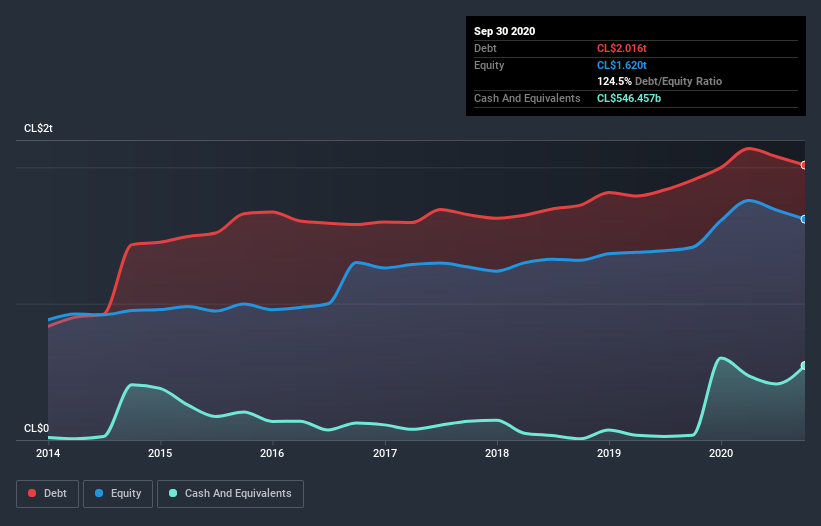- Chile
- /
- Wireless Telecom
- /
- SNSE:ENTEL
Does Empresa Nacional de Telecomunicaciones (SNSE:ENTEL) Have A Healthy Balance Sheet?

The external fund manager backed by Berkshire Hathaway's Charlie Munger, Li Lu, makes no bones about it when he says 'The biggest investment risk is not the volatility of prices, but whether you will suffer a permanent loss of capital.' When we think about how risky a company is, we always like to look at its use of debt, since debt overload can lead to ruin. Importantly, Empresa Nacional de Telecomunicaciones S.A. (SNSE:ENTEL) does carry debt. But the more important question is: how much risk is that debt creating?
When Is Debt A Problem?
Debt assists a business until the business has trouble paying it off, either with new capital or with free cash flow. If things get really bad, the lenders can take control of the business. However, a more frequent (but still costly) occurrence is where a company must issue shares at bargain-basement prices, permanently diluting shareholders, just to shore up its balance sheet. Of course, debt can be an important tool in businesses, particularly capital heavy businesses. When we think about a company's use of debt, we first look at cash and debt together.
View our latest analysis for Empresa Nacional de Telecomunicaciones
How Much Debt Does Empresa Nacional de Telecomunicaciones Carry?
You can click the graphic below for the historical numbers, but it shows that as of September 2020 Empresa Nacional de Telecomunicaciones had CL$2.02t of debt, an increase on CL$1.91t, over one year. However, it also had CL$546.5b in cash, and so its net debt is CL$1.47t.

How Strong Is Empresa Nacional de Telecomunicaciones's Balance Sheet?
We can see from the most recent balance sheet that Empresa Nacional de Telecomunicaciones had liabilities of CL$769.1b falling due within a year, and liabilities of CL$2.72t due beyond that. On the other hand, it had cash of CL$546.5b and CL$463.4b worth of receivables due within a year. So its liabilities total CL$2.48t more than the combination of its cash and short-term receivables.
This deficit casts a shadow over the CL$1.33t company, like a colossus towering over mere mortals. So we'd watch its balance sheet closely, without a doubt. After all, Empresa Nacional de Telecomunicaciones would likely require a major re-capitalisation if it had to pay its creditors today.
In order to size up a company's debt relative to its earnings, we calculate its net debt divided by its earnings before interest, tax, depreciation, and amortization (EBITDA) and its earnings before interest and tax (EBIT) divided by its interest expense (its interest cover). The advantage of this approach is that we take into account both the absolute quantum of debt (with net debt to EBITDA) and the actual interest expenses associated with that debt (with its interest cover ratio).
While Empresa Nacional de Telecomunicaciones's debt to EBITDA ratio (3.1) suggests that it uses some debt, its interest cover is very weak, at 1.6, suggesting high leverage. In large part that's due to the company's significant depreciation and amortisation charges, which arguably mean its EBITDA is a very generous measure of earnings, and its debt may be more of a burden than it first appears. It seems clear that the cost of borrowing money is negatively impacting returns for shareholders, of late. More concerning, Empresa Nacional de Telecomunicaciones saw its EBIT drop by 5.1% in the last twelve months. If it keeps going like that paying off its debt will be like running on a treadmill -- a lot of effort for not much advancement. The balance sheet is clearly the area to focus on when you are analysing debt. But it is future earnings, more than anything, that will determine Empresa Nacional de Telecomunicaciones's ability to maintain a healthy balance sheet going forward. So if you're focused on the future you can check out this free report showing analyst profit forecasts.
Finally, a company can only pay off debt with cold hard cash, not accounting profits. So we clearly need to look at whether that EBIT is leading to corresponding free cash flow. Over the most recent three years, Empresa Nacional de Telecomunicaciones recorded free cash flow worth 58% of its EBIT, which is around normal, given free cash flow excludes interest and tax. This cold hard cash means it can reduce its debt when it wants to.
Our View
To be frank both Empresa Nacional de Telecomunicaciones's interest cover and its track record of staying on top of its total liabilities make us rather uncomfortable with its debt levels. But at least it's pretty decent at converting EBIT to free cash flow; that's encouraging. We're quite clear that we consider Empresa Nacional de Telecomunicaciones to be really rather risky, as a result of its balance sheet health. For this reason we're pretty cautious about the stock, and we think shareholders should keep a close eye on its liquidity. When analysing debt levels, the balance sheet is the obvious place to start. But ultimately, every company can contain risks that exist outside of the balance sheet. To that end, you should learn about the 3 warning signs we've spotted with Empresa Nacional de Telecomunicaciones (including 1 which is concerning) .
If, after all that, you're more interested in a fast growing company with a rock-solid balance sheet, then check out our list of net cash growth stocks without delay.
If you decide to trade Empresa Nacional de Telecomunicaciones, use the lowest-cost* platform that is rated #1 Overall by Barron’s, Interactive Brokers. Trade stocks, options, futures, forex, bonds and funds on 135 markets, all from a single integrated account. Promoted
Valuation is complex, but we're here to simplify it.
Discover if Empresa Nacional de Telecomunicaciones might be undervalued or overvalued with our detailed analysis, featuring fair value estimates, potential risks, dividends, insider trades, and its financial condition.
Access Free AnalysisThis article by Simply Wall St is general in nature. It does not constitute a recommendation to buy or sell any stock, and does not take account of your objectives, or your financial situation. We aim to bring you long-term focused analysis driven by fundamental data. Note that our analysis may not factor in the latest price-sensitive company announcements or qualitative material. Simply Wall St has no position in any stocks mentioned.
*Interactive Brokers Rated Lowest Cost Broker by StockBrokers.com Annual Online Review 2020
Have feedback on this article? Concerned about the content? Get in touch with us directly. Alternatively, email editorial-team (at) simplywallst.com.
About SNSE:ENTEL
Empresa Nacional de Telecomunicaciones
Empresa Nacional de Telecomunicaciones S.A.
Established dividend payer and good value.
Similar Companies
Market Insights
Community Narratives



